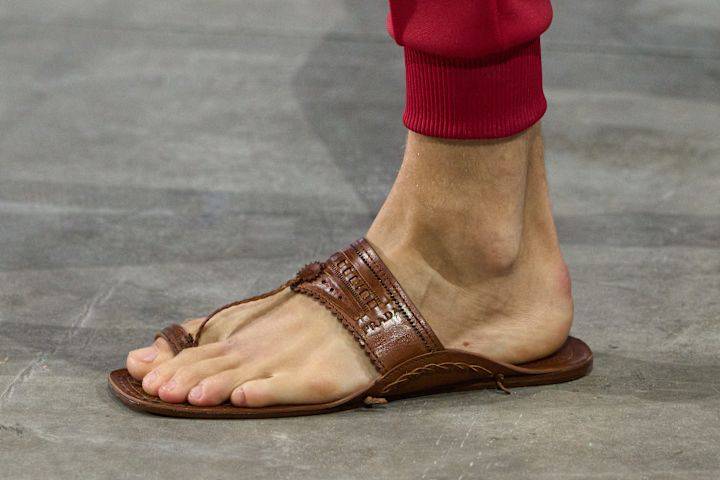Luxury fashion house Prada officially confirmed in a letter to the Chamber of Commerce, Industry and Agriculture of Maharashtra (Maccia) that the sandals shown during the recent men’s fashion show, and which showed a striking similarity with the traditional Indian Kolhapuri-Sandaal, were indeed inspired by the iconic footwear.
Prada has now proposed a video conference interview with Maccia to continue the discussion and to explore possible partnerships, including the possibility of co-branding of the iconic footwear, according to the communication that Maccia has received. The meeting is planned for the time being on 11 or 15 July. On behalf of the Prada Group, Lorenzo Bertelli, Christopher Aaron Bugg, communication director worldwide; Roberto Massardi, Director of Business Development; and Francesca Secondari, general counsel for the group, are present.
Chamber acts in response to the call from craftsmen after inequality
The controversy arose after Prada brought these sandals to the market under their own label, without initially mentioning Indian origin. Maccia then wrote to Patrizio Bertelli, a director at Prada, to raise these concerns. In response, Lorenzo Bertelli, head of Corporate Social Responsibility at Prada Group, sent a written announcement to Maccia. He acknowledged the global recognition of Kolhapuri-Chappals (sandals) as a symbol of the identity of Kolhapur (city in Maharashtra, India) and the cultural pride of the state.
The brand admitted that it had shown Kolhapuri-like sandals in their show, initially presenting them as Italian. This led to accusations of cultural appropriation and commercial exploitation of traditional Indian manual work without appropriate recognition or compensation.
The intervention of Maccia followed a call from local artisans in Kolhapur, who expressed their deep disappointment about the considerable difference between their income and prices of Prada. While local craftsmen make authentic Kolhapuri chappals for only four hundred Indian rupees, Prada reportedly sold his Kolhapuri-like sandals for more than 100,000 Indian rupees.
Discouraged by this lack of recognition and the enormous commercial gap, the craftsmen insisted on the Chamber of Commerce of Maharashtra to take action. To defend the legacy of the craftsmen and the cultural significance of the footwear, Gandhi contacted Prada to clarify the actual situation.
Prada admits, invites dialogue and is committed to responsible design
In his extensive reaction, Prada acknowledged that the sandals that were shown during the Prada Heren SS 2026 Fashion Show represent an age -old Indian traditional tradition.
The company indicated to understand the cultural value of Indian craftsmanship and to commit itself to ‘responsible design practices, improved cultural involvement and the opening of a meaningful dialogue with local craft communities in India’.
Prada further assured Maccia from his intention to honor and retain the unique craftsmanship that exists excellence and heritage. The brand indicated that it was significantly open to further discussions and meetings with Maccia to explore cooperation options.
This article has been translated into Dutch using an AI tool.
FashionUnited uses AI Taaltools to speed up the translation of (news) articles and to test the translations to improve the end result. This saves our human journalists time that they can spend on research and writing their own articles. Articles translated with the help of AI are checked and edited by a human desk editor before they go online. If you have any questions or comments about this process, send an e-mail to info@fashionunited.com.


